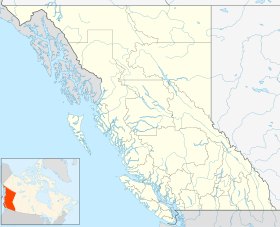Scott Islands Marine National Wildlife Area
| Scott Islands Marine National Wildlife Area | |
|---|---|
IUCN category VI (protected area with sustainable use of natural resources)[1] | |
| Location | Scott Islands, British Columbia |
| Nearest city | Port Hardy |
| Coordinates | 50°45′00″N 129°15′00″W / 50.75000°N 129.25000°WCoordinates: 50°45′00″N 129°15′00″W / 50.75000°N 129.25000°W |
| Area | 11,570.65 km2 (4,467.45 sq mi) |
| Designation | National Wildlife Area |
| Designated | 2018 |
| Governing body | Canadian Wildlife Service |
| Website | Scott Islands Marine NWA |
Scott Islands Marine National Wildlife Area is a National Wildlife Area off the northwestern tip of Vancouver Island in British Columbia, Canada. Covering an area of 11,570.65 km (7,189.67 mi), it is the second largest protected area in British Columbia after Offshore Pacific Seamounts and Vents Closure and is the largest national wildlife area in Canada.[2]
Geography
The national wildlife area protects a large area of the Pacific Ocean and Queen Charlotte Sound surrounding Cape Scott and the Scott Islands. The islands themselves are already protected by the provincially-designated protected areas of Lanz and Cox Islands Provincial Park, Beresford Island Ecological Reserve, Sartine Island Ecological Reserve, and Anne Vallee Ecological Reserve.
Ecology
Flora
The waters surrounding the islands host kelp beds.[3]
Fauna
The Scott Islands provide critical breeding and nesting habitat for 40% of British Columbia's seabirds. Bird species of note include tufted puffin, short-tailed albatross, black-footed albatross, Cassin's auklet, rhinoceros auklet, common murre, marbled murrelet, ancient murrelet, pink-footed shearwater, sooty shearwater, and bald eagle.[2][3]
Resident mammal species include sea otter, northern sea lion, orca, humpback whale, and gray whale.[3]
See also
References
- ^ "Scott Islands Marine National Wildlife Area". Protected Planet. Retrieved 24 September 2020.
- ^ a b Canada, Environment and Climate Change (24 March 2011). "Scott Islands marine National Wildlife Area". aem. Retrieved 24 September 2020.
- ^ a b c Environment, Ministry of. "Lanz and Cox Islands Provincial Park - BC Parks". bcparks.ca. Retrieved 24 September 2020.
- Articles with short description
- Short description with empty Wikidata description
- Use Canadian English from September 2021
- Use dmy dates from September 2021
- IUCN Category VI
- Coordinates not on Wikidata
- National Wildlife Areas of Canada
- Protected areas of British Columbia
- Regional District of Mount Waddington
